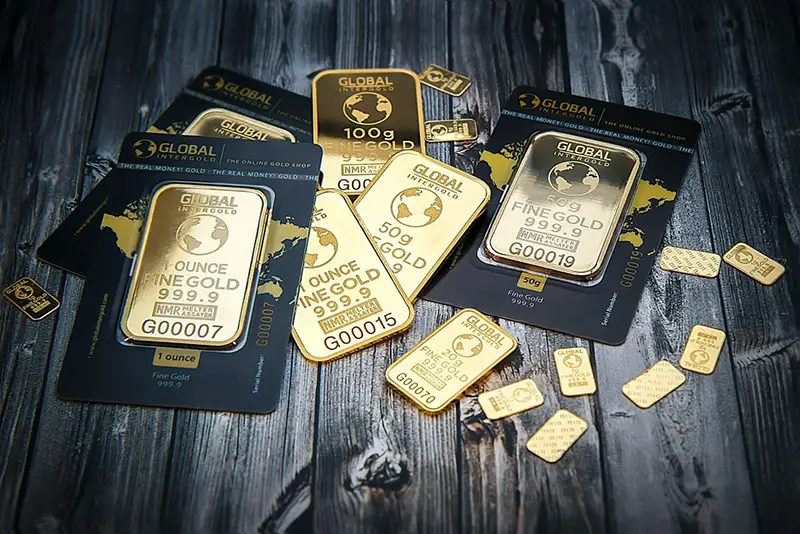Click here to get this post in PDF
In a time of uncertainty and falling asset prices, it’s a smart idea to diversify your portfolio and hold gold. This will mitigate losses in one asset while generating good returns in the mid-term. Investing in physical gold will also reduce overall volatility. In fact, experts recommend holding up to 15% of one’s assets in gold.
Price stability
Gold has long been viewed as a hedge against inflation, making it an ideal asset for investors who seek to maintain the purchasing power of their money. Since inflation is usually accompanied by a decline in nominal rates, central banks will not automatically raise their main interest rates. Click here for more information about inflation. Instead, they will tend to lower them.
While other types of investments have high volatility, gold is more stable. Unlike stocks and bonds, gold’s price does not drop massively during economic crises. As a result, many people invest in gold during these times. However, you should consider the risks associated with holding gold as it is not a great investment for all investors.
Financial advisors recommend only investing about 10 percent of your savings in gold. When considering investing in gold, you should carefully consider the risks involved and your own personal goals before making a decision.
Another benefit of owning gold is that its value remains fixed in terms of its market value. Central banks often settle international trade deficits and surpluses in gold. This allows them to self-correct their monetary imbalances by reducing domestic pricing. This in turn, attracts international buyers.
Another benefit of owning gold is that it is a great hedge against inflation. The US CPI is not an accurate measure of inflation, but it is still a good way to hedge against it. However, this sensitivity to inflation should be considered in the context of the investor’s access to other forms of inflation protection.
This protection can be achieved through central bank policy, financial assets, and real assets. These three types of protections are increasingly available to investors in developed markets.

Tax considerations
While most investors view the cost of owning bullion as mainly the markups on dealer products and the management fees associated with bullion funds, the fact is that taxes on bullion assets are a substantial part of the total cost of the precious metal. In fact, taxes on bullion investments can represent as much as 30% of the total cost of the metal.
Bullion is treated as a collectible, and therefore carries a higher tax rate than most investment assets. In the United States, the Internal Revenue Service classifies bullion as a collectible. As a result, it is taxed at a 28% long-term capital gains rate, compared to a 15% or 20% long-term capital gain tax on most other assets held for more than one year.
When selling your Bullion, you will have to pay tax on the gain. If you sold your Bullion for $300 an ounce, you would owe taxes on that amount, and the price difference would be considered your capital gain. For this reason, you must keep records of your purchases. This way, you can minimize the tax burden on your Bullion purchases.
There are many ways to invest in bullion. You can open a brokerage account, use a traditional IRA, purchase Bullion mining ETFs, or invest in Bullion mining corporations. In most cases, the gains on stocks, mutual funds, and Bullion mining ETFs are taxed as long-term capital gains. But even with these advantages, you should consult a tax professional to make sure you have the best option for you.
One alternative to investing in Au is by purchasing Au bullion. Bullion means the actual physical quantity of Au. There are also products that invest in Au bullion and purchase it on your behalf. ETFs are another option, but these methods can greatly increase your tax burden. And, if you don’t want to carry the additional costs, you can invest in Au ETFs.
If you own physical Au, you won’t have to worry about taxes on the gains until you withdraw the cash. If you’re going to take out the money as cash, you’ll likely have to pay ordinary income tax rates. That means that if you’re wealthy and sell your Au, you will pay more than an average taxpayer.
Investing in gold as a safe haven
Gold is often seen as a safe haven asset. This is because the price of Au tends to go up during market turmoil. Investing in Au can be beneficial, but it’s also a risky endeavor. The risk is not the same for every investor.
Investing in Au has several advantages, including the fact that it provides a defensive hedge against the turbulence of the stock market and is convertible to cash. It also has a low correlation with other assets, making it a good diversifier. It has also outperformed stocks and bonds for periods of time. Its price goes up and down, so it diversifies a portfolio and reduces overall volatility.
Au is also a safe haven for those who are afraid of risky investments. Investing in Au has become a popular choice for those who are concerned about the future of the stock market. It has historically tended to be less volatile than other assets and is a good alternative to stocks. In fact, it has even been used as a hedge-by-hedge funds.
Au prices have consistently outperformed stocks and bonds during every recession since 1970. Click the link: https://nma.org/wp-content/uploads/2016/09/historic_gold_prices_1833_pres.pdf for more information. Gold bars, however, provide no income and are less attractive as interest rates rise, driving up returns on other safe havens. Moreover, gold is less attractive than shares, which continue to pay dividends even when stock markets decline.
While investing in gold has its pros and cons, it is also important to consider the risks and costs involved. For one, investing in gold has negative correlation to the stock market. While gold increased during the Great Recession, it did not perform as well during the 2020 crash. However, during strong markets, stocks will typically yield higher returns.
Although precious metals are often considered to be a haven, it has a high risk of loss. It’s not a safe haven for the price of other assets, but it can serve as a hedge for a portfolio.
Buying precious metals bullion
Owning precious metals is a great way to diversify your portfolio. Many experts agree that portfolio diversification is important to minimize investing risks. While other asset classes have some correlation with one another, precious metals is relatively uncorrelated. Furthermore, it tends to go up during times of financial crisis.
In addition to being a safe and reliable investment, precious metals can be stored in a safe place. Unlike other assets, precious metals are not dependent on electronic systems and is therefore free of risks associated with counterparty risk. Even if your bank goes bankrupt, you can still withdraw your precious metals from the bank and keep your investments safe.
Another advantage of owning precious metals bullion is its high liquidity. You can always convert it into cash whenever you want to. This is not true of paper precious metals and exchange-traded funds (ETFs). Precious metals bullion’s price tends to maintain its value for a long time. As such, it can be a good way to protect your assets against stock market jitters and inflation.
There are also no fees to keep and liquidate your precious metals. In addition, you can sell it in the market if you need to, so you can cash in on the value at any time. You can also use it as collateral for a loan from a bank. Banks will usually lend you money against your precious metals if it is in good condition, and in return you will return the precious metals without any damage.
Owning physical precious metals is a good way to invest in financial insurance and a nest egg. Although you might not need the precious metals immediately, you may want to keep it for a long time. And if you do decide to sell it at some point, you can always buy more.
Another advantage of owning precious metals bullion is that you can transfer it internationally without incurring any fees. While wire transfers don’t normally incur any fees, you need to pay taxes if you’re leaving the country. If you have to withdraw money from a foreign bank, you’ll have to pay more fees.
You may also like: 5 Reasons Why You Should Invest In Gold

